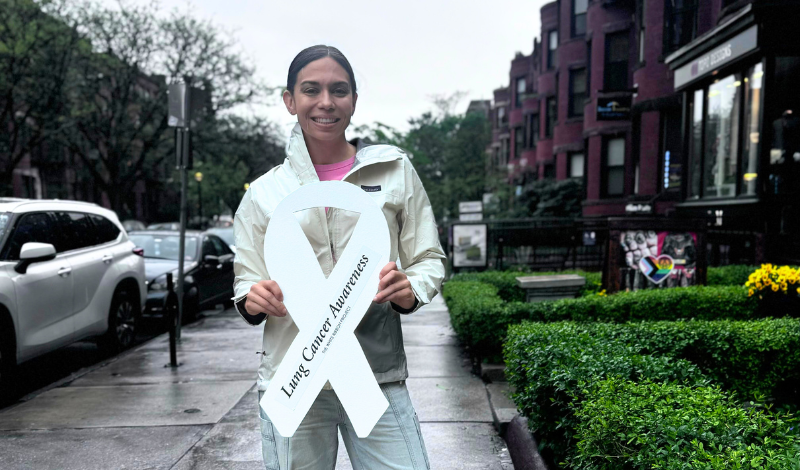
With deep sadness, we share that our friend, advocate, and member of LCFA’s Speakers Bureau, Ashley Vassallo, has passed away. Ashley transformed a year-long fight for an accurate diagnosis into fearless advocacy as @onelunglady—educating others about early detection, treatment options, and self-advocacy. Her legacy lives on in the patients and caregivers she empowered. Please keep her family in your thoughts, and read her story below in honor of her life and impact.
Ashley Vassallo’s journey to diagnosis began in October 2022. Instead of being able to fully enjoy her vacation in Tahoe, Ashley Vassallo, then 34 years old, wasn’t feeling herself. It would be a full year before she was properly diagnosed. The issues were subtle: her breathing felt different, she was, with enough frequency to be concerning, choking when she ate, and her ability to exercise was noticeably diminished. She knew that whatever was happening needed to be diagnosed. A young, healthy mother of two, Ashley, who regularly did yoga, lifted weights, and practiced Jiu Jitsu, knew something was wrong. After a telehealth visit while on vacation, she reported to her doctor that she thought she had a tumor in her lung. Her doctor laughed. Literally laughed.
Multiple Misdiagnoses
Ashley would spend the next 366 days seeking a reason for her symptoms. As many lung cancer patients experience, she was repeatedly misdiagnosed. She was told it was anxiety, pneumonia, and long Covid. However, as a hospice care social worker, Ashley was tested for Covid three times a week. She knew long Covid was impossible. She had never had Covid. She was relentless in pursuing a proper diagnosis.
Was it stress? Gerd? Asthma? No, no, and no.
The Emergency Room Revelation
A year and one day after visiting her doctor following her trip to Tahoe, Ashley became so ill that she wound up in the emergency room. The medical team ran several tests, including a D-dimer test. This test is used to detect blood clots, specifically deep vein thrombosis and/or pulmonary embolisms. It was soon determined that Ashley did indeed have a pulmonary embolism: a sudden blockage in your pulmonary arteries, the blood vessels that send blood to your lungs.
“This is the least of your problems.”
The Critical Discovery
Ashley was immediately admitted to the hospital and would spend the next two weeks undergoing tests and having scans and blood work. In the end, she would be diagnosed with non-small cell lung cancer, stage 3B. It was only then that Ashley had a PET scan an imaging test that uses a radioactive tracer to create detailed images of the body’s organs and tissues. Through this testing, doctors learned that, in addition to the tumor in her lung, Ashley also had a lesion on her spine. Her cancer was now stage 4.
Fighting for Treatment
After being told that her lung cancer was inoperable, Ashley endured chemotherapy, immunotherapy, and radiation treatments yet the disease stubbornly remained. A fierce advocate, Ashley went back to her doctor and made enough of a case that the doctor relented and agreed to remove one of her lungs. Ashley’s hopes were dashed just a few months later when that same physician did a 180 and refused to perform the surgery. Alone at the appointment, Ashley pressed him as to why he had an about-face. His only response was, “It is going to come back.”
Refusing to take no for an answer, Ashley went full throttle on self-advocating and found a surgeon across the country in Boston who was willing to perform a pneumonectomy (removal of a lung). While she was thrilled, she knew it was impractical to have surgery so far from her home in California. Fortunately, the Boston doctor had a colleague nearer to where Ashley lived. She and the surgeon quickly connected and three months later, Ashley successfully underwent the surgery.
Life After Surgery
Three months later, Ashley returned to work as a hospice social worker. Despite requesting that she not have lung cancer patients on her roster, she was assigned to several. The situation was intensely stressful and resulted in a difficult case of Shingles. And then, to add insult to injury, lung cancer scans came back showing a recurrence of disease. It was then that Ashley decided to step away from work and focus on her healing.
“I was so angry. I just cannot figure it out. There is no history of lung cancer in my family. I always prioritized my health. I was just trying to live and be the best mom to my two kids. I knew I needed to take a step back and prioritize my physical and mental health.”
Current Journey and Looking Forward
Three months following her pneumonectomy, while having immunotherapy, Ashley started to feel unwell. Assuming it was just exhaustion from all she had been through, she pushed herself…until she simply could not. She could hardly stay awake, let alone take care of her children. She would soon learn that she was suffering from immunotherapy-induced hepatitis. This was a turning point: there were no other treatment options.
Unwilling to accept that she was left with no options, Ashley aggressively pursued second opinions and researched clinical trials for which she might qualify. She has had a few recurrences since the hepatitis and contues to figure out the best treatment route
Looking back on her journey to diagnosis and everything that followed, Ashley refuses to give up. While she awaits her April 2025 scans that will determine future treatment possibilities, she’s making the most of every day. She cherishes time with her kids and creates engaging content for the lung cancer community as @onelunglady. Her story serves as a powerful reminder of the importance of self-advocacy in the often-complicated journey to diagnosis and treatment.

